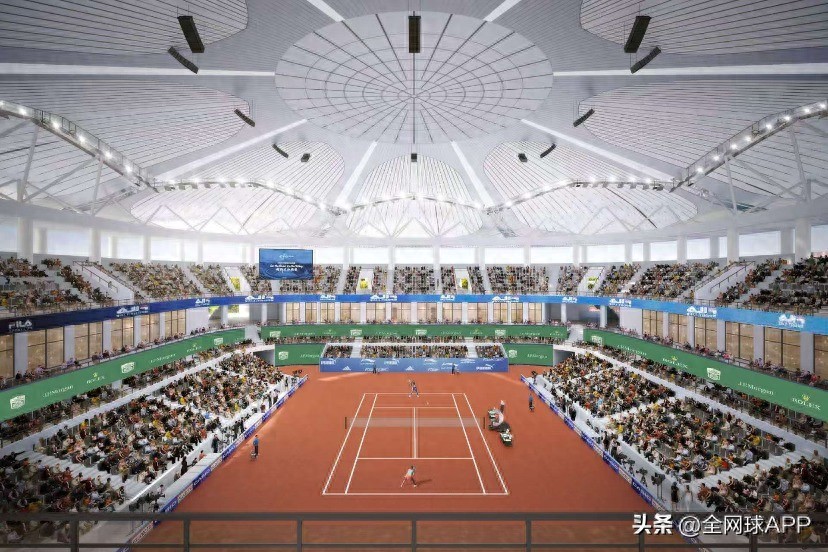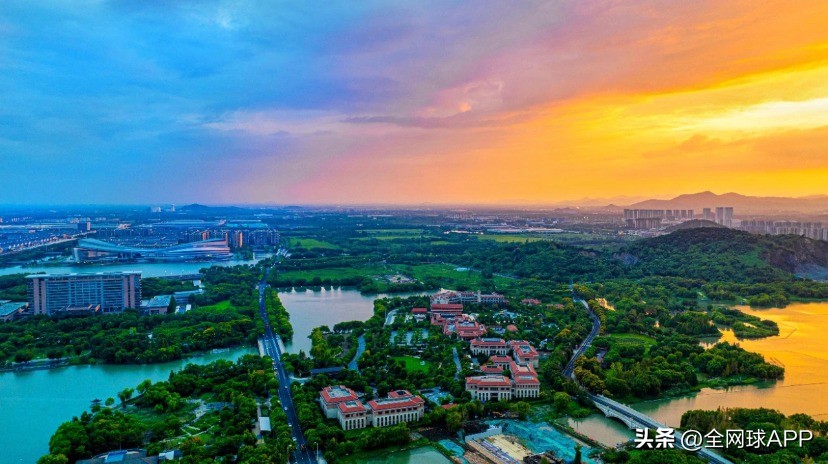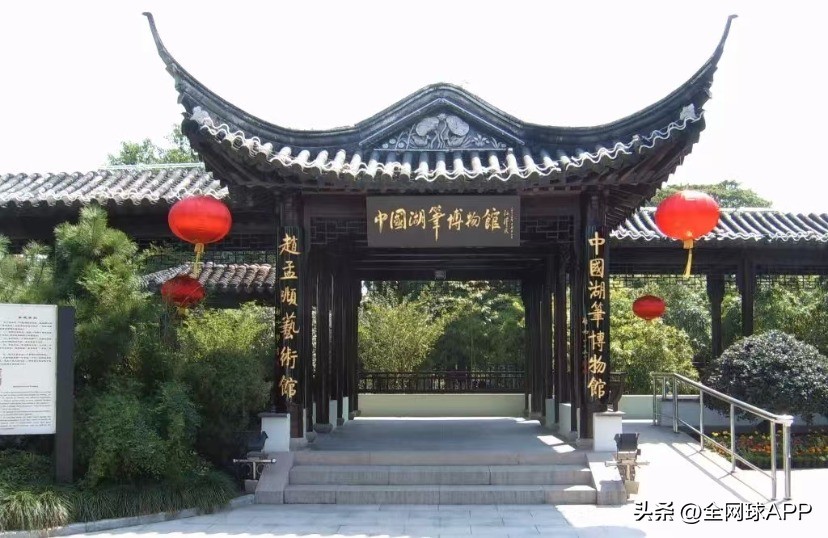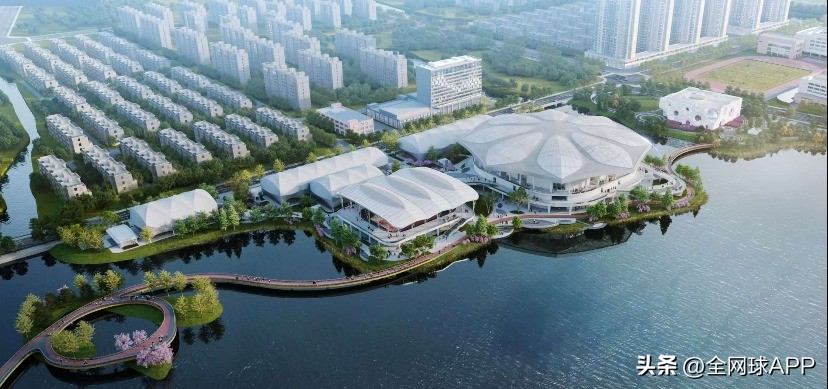The Shining Pearl of South Taihu Lake: The Past and Present of Huzhou
In recent days, tennis fans must have been "swiped" by the city of Huzhou! Asia's largest clay tennis center will be officially inaugurated this spring, and this tennis base built according to the highest international level of French Roland Garros standards will further deepen the indissoluble bond between Chinese and clay.

Huzhou International Clay Tennis Center has 14 clay courts and 4 high-standard acrylic hard courts, in addition to a 5,000-seat center court and a 2,000-seat auxiliary court. If you are lucky enough to visit this "Asian clay tennis No. 1 Stadium", you might as well feel the unique charm of this city, let's walk into Huzhou together, and explore the past and present life of the thousand-year-old city.
Past life: The land of fish and rice, with a long history of humanity
Huzhou is a national historical and cultural city with a history of 5,000 years of civilization and nearly 2,300 years of construction, and is the birthplace of silk culture, Hubi culture, tea culture and porcelain culture, and was officially elected as the "Cultural Capital of East Asia" in 2025 last year, becoming the fourth city in Zhejiang Province to win this honor after Ningbo, Shaoxing and Wenzhou.

This historical and cultural city has witnessed the splendor of Chinese civilization, and Huzhou is not only an economic prosperity, but also a place of cultural gathering, and has been a gathering place for literati and artists since ancient times. Wang Xizhi, Yan Zhenqing, Su Shi and other cultural celebrities have left footprints here, wrote countless popular poems, the Yuan Dynasty poet Dai Biaoyuan once wrote "travel all over the south of the Yangtze River, life only live in Huzhou" good sentences.
The Qianshanyang site in the suburbs of the city was named "the source of silk in the world", and "Jili Lake Silk" won the gold medal of the first World Expo in London, England in 1851; The first lake pen of the "Four Treasures of the Study" was produced in Huzhou, which gave birth to Cao Buxing, Zhao Mengfu, Wu Changshuo and other calligraphy and painting masters, attracting Wang Xizhi, Wang Xianzhi, Yan Zhenqing, Su Shi and other famous artists to splash ink here, there is "a history of calligraphy and painting, half in Huzhou" said; Tea saint Lu Yu completed the world's first tea masterpiece "The Book of Tea" here; The site of the original porcelain kiln in Deqing is known as the "birthplace of Chinese porcelain".
As the county of Jiangnan Wang, Huzhou has the reputation of "Suhu is ripe, the world is full" since the Song Dynasty, and the Suhu Lake here is now Suzhou and Huzhou, which means that the grain in the Suhu area can not only be self-sufficient, but also supply a large number of the whole country, which shows the prosperity of local agricultural development. Because Huzhou is located in the Taihu Lake Basin, the water network is dense, the land is fertile, and agricultural products such as rice, fish and shrimp, water chestnut are abundant here, which can be described as the real "land of fish and rice", and gradually formed a unique water town culture in the south of the Yangtze River.
During the Ming and Qing dynasties, due to the best-selling of "Jili Lake Silk", Huzhou's economy flourished unprecedentedly, so a large number of wealthy businessmen emerged, and they were collectively called "four elephants, eight cows and seventy-two golden dogs" by the locals. These modern lake merchants have accumulated huge wealth that rivals the wealth of the country, and have witnessed the development and changes of China's national industry and commerce. The long-term economic prosperity of Huzhou has made the local people more respectful of literature and education, and has precipitated a very profound historical heritage and rich cultural atmosphere.
In this life: a new opportunity, happiness blooms in every corner
In the tide of the times, Huzhou has always adhered to survival and development, and embraced the present and future with a new attitude. Today, Huzhou still maintains a strong cultural atmosphere. Huzhou Museum, Huzhou Library and other cultural facilities provide rich spiritual food for the public, and the annual Hubi Cultural Festival has become an important platform to display Huzhou culture.

Huzhou is home to the United Nations Global Geographic Information Knowledge and Innovation Center and the only innovation demonstration area for the national sustainable development agenda in the Yangtze River Delta region. After the reform and opening up, Huzhou's private economy flourished, forming a number of block economies with Huzhou characteristics, such as Wuxing children's clothing, Nanxun wood flooring, Deqing plate, Changxing battery, and Anji chair industry. In recent years, Huzhou has accelerated the construction of a "2+8" high-energy platform, and built eight emerging industries such as new energy vehicles and key components, semiconductors and optoelectronics, biomedicine, and geographic information +.
Huzhou has significant geographical advantages, unique ecological environment, and is located in the geographical center of the Taihu Lake region and the Yangtze River Delta, which belongs to the "Shanghai Metropolitan Area" and "Hangzhou Metropolitan Area", and is an important hub of "connecting Shanghai and Hangzhou, connecting Jiangsu and Anhui, coordinating around the lake, and radiating the inland", which contains huge development potential. At the end of 2024, the Shanghai-Suzhou-Lake high-speed railway will be put into operation, and the travel time between Huzhou and Shanghai will be shortened by half to one hour, which is an extremely valuable development opportunity for Huzhou in recent years and will bring a broad space for Huzhou's future economic development.
Thanks to its high-quality economic foundation, well-developed transportation network, beautiful natural environment and steadily growing quality of life of residents, Huzhou is one of the regions with the most balanced urban and rural development and the most stable social environment in China, and has been rated as "China's happiest city" for three consecutive years.

Life lies in movement, and the secret of happiness is also reflected in physical and mental health. In recent years, various sports events and various sports venues have landed in Huzhou, and the wave of sports is becoming popular in this land. With the completion of the Huzhou International Clay Tennis Center, the "Asian Clay Tennis No. 1 Stadium" will usher in the first large-scale professional tennis tournament from April 21 to 27 - the opening match of the 2025 China Tennis Tour. By holding high-level events, Huzhou will further explore the development path of "sports +" diversified integration and promote the vigorous development of the sports industry.
(Part of the source: "Wuxing Cultural Tourism Sports" public account)







 Links
Links
 Contact
Contact
 App
App


